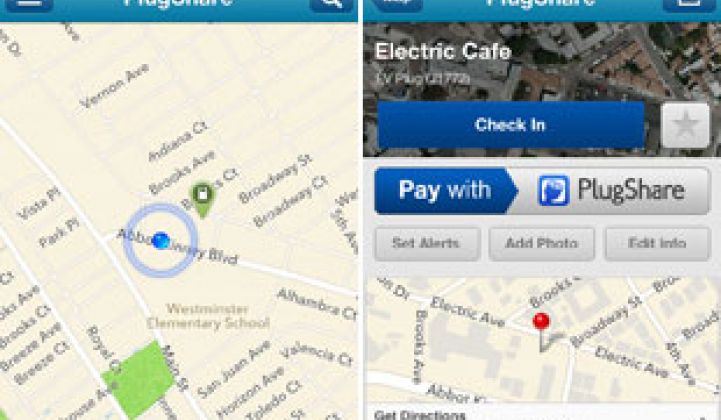The tens of thousands public electric-vehicle-charging stations across the U.S. can be viewed as a soothing balm for those EV drivers suffering from real or imagined range anxiety.
But the stations, which might be operated by a retailer, government or other entity, also bring another kind of agita.
“Paying for charging and understanding how much it’s going to cost are really big problems,” said Forrest North, COO of Recargo and a Nissan Leaf driver.
Recargo, which merged with Xatori earlier this year, already offers a successful app that helps drivers find charging stations. The app, PlugShare, recently expanded to let people review charging stations. Now, the app has taken the next step to allow drivers to pay for the charge directly through the app, Pay With PlugShare.
The first charging station company to join Recargo’s network is SemaConnect, which has about 600 stations in North America. At the launch, Pay With PlugShare will work with about half of the stations. Customers can sign up through the PlugShare app. There is no membership fee, and it doesn’t require preloaded funds. Then, each customer can pay directly at the station.
“We want to define a higher standard for the charging experience based on quality, not quantity, for all electric vehicle drivers,” Mahi Reddy, CEO and founder of SemaConnect, said in a statement.
One of the biggest headaches for EV drivers, according to Recargo, is the wildly variable pricing schemes for charging stations. Set aside the fact that some chargers are part of membership networks and some are not (drivers can search by these features in the app). Even the stations that don’t require a membership might have different rates at different times of the day, some might be free for some period of time and then charge, while for others, it’s a flat fee.
“There’s a pretty big disconnect between drivers and whoever runs the infrastructure,” said North. The ultimate goal is for Recargo to encourage infrastructure managers to adopt simpler pricing, but it will not require network operators to choose any specific type of payment options. Pay With PlugShare will also support the Open Charge Point Protocol.
Recargo’s research has found 70 percent of drivers would like to pay per kilowatt-hour, but few stations list the price that way. The prices are set by the person in a company who operates the charging station at each location, and not necessarily the charging station manufacturer, or even a retail company’s central office.
“We’d like to be influencing both drivers and station operators -- that will be best for EV adoption,” said North. However, it is unclear if individual station owners will be willing to tweak pricing models. But that doesn’t mean Recargo isn’t getting any love. The company has found friends amongst car makers, including Nissan and Ford.
North noted that for car makers and EV charging-station manufacturers, making great apps is not necessarily their specialty. Car makers are already outsourcing that work, and some charging companies also use third parties for the payment systems for the chargers.
A simpler, universal payment system sounds like a win for drivers, but it only has that potential if other large charging networks join Recargo. “Their customer is the property owner,” noted North, “not the driver.”
But if Recargo can woo the larger charging networks, such as eVgo and ChargePoint, the infrastructure owners may be swayed by the power of customer choice, enabled by an app. “Our goal is not to have a monopoly on EV charging,” said North, “we just want to make it easier.”



